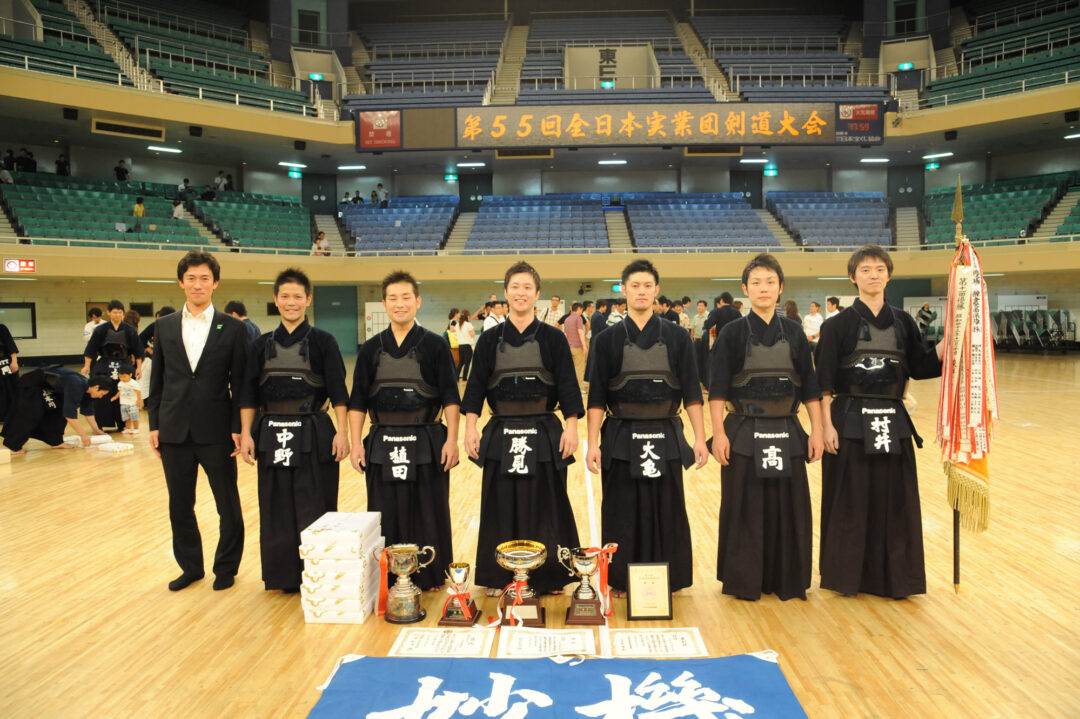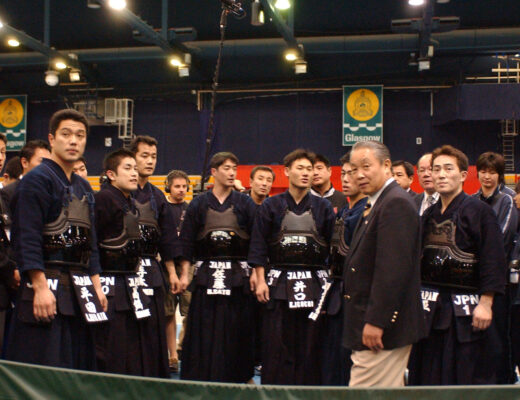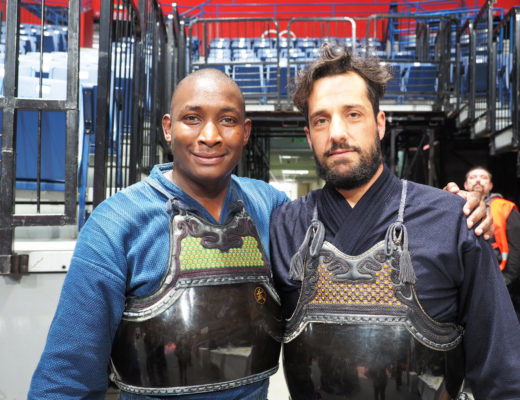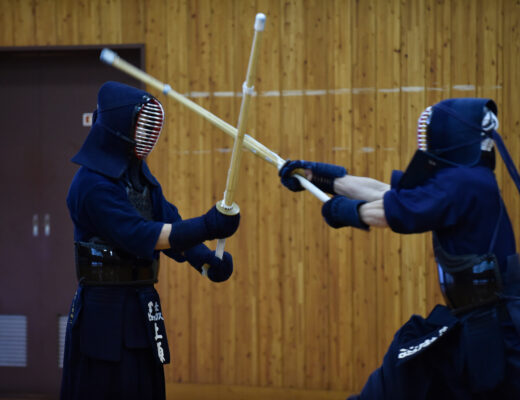2013.1 KENDOJIDAI
Interview and Text: Yanagida Naoko
*Unauthorized reproduction or use of any images in this article is strictly prohibited.
In Japan, people from a wide range of age groups, from elementary school to university, practice Kendo. Beyond that, Kendo is also very active among working adults with numerous tournaments held throughout the year.
In this article, we feature an interview from our 2013 archives with corporate Kendo player Ogame Kenta. From a young age, he has consistently competed at the top level and demonstrated strong leadership. What kind of mindset did Ogame have toward Kendo at that time?
Ogame Kenta
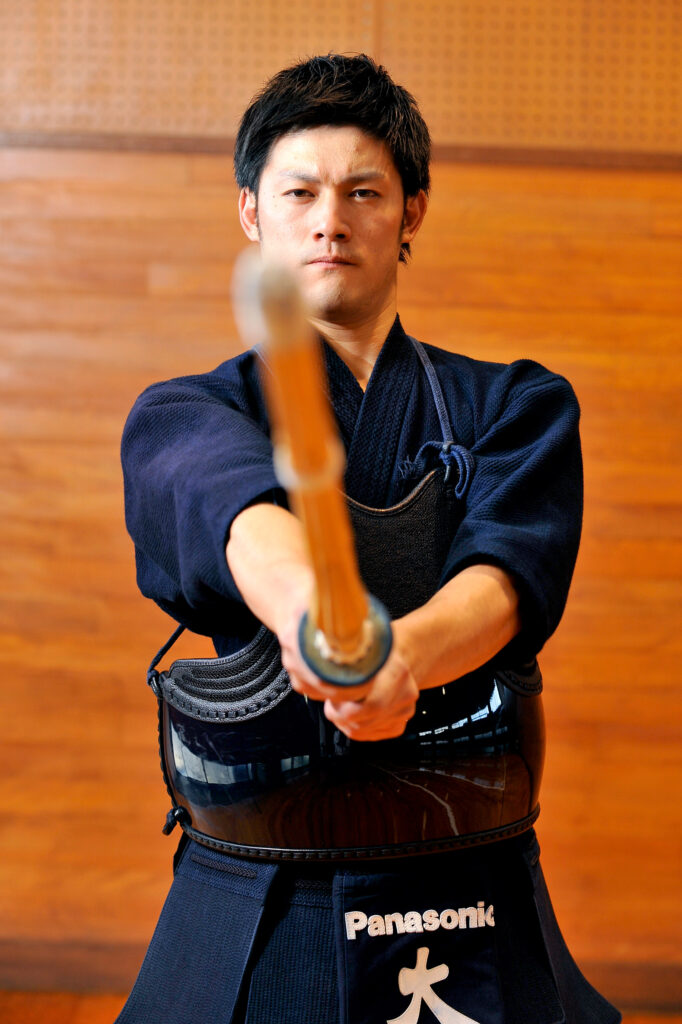
A Determined Challenge at the All Japan Business Kendo Championship
In September 2012, at the All Japan Business Kendo Championship, a young ace found his breakthrough. In his fourth year at the company, Ogame Kenta delivered an outstanding performance, earning the Most Valuable Player Award and leading his team to reclaim the national title for the first time in two years.
“This was my first time competing as Chuken. For the past three years, I had fought as Senpo, but when Takizaki Ryoichi, a member of the previous championship team, was transferred overseas, I volunteered to take Chuken,” Ogame recalls.
It was his first time in this role since joining Panasonic, and although he felt some uncertainty, the unwavering support of his teammates carried him through. Trusting them completely and driven by the shared goal of “winning together,” he was able to give everything he had on the floor.
“The Senpo position I had held until then was taken over by Ko Yuji, first-year employee and my junior from Chuo University. In the Jiho, Fukusho, and Taisho positions were senior teammates I deeply trusted, so I was able to compete with peace of mind.”
In fact, during the Kanto training matches held in September, the team did not perform as well as expected. Although Ogame himself did not participate in that trip, hearing about the results made him think, ‘I have to step up.’ His determination to win the national title and his sense of responsibility toward the team grew even stronger.
At the All Japan Business Kendo Championship, his movements were exceptionally sharp.
“Everyone was in great form that day,” he recalls. “The key moment came in the quarterfinal match against Fuji Xerox Tokyo. It was the first time we were behind in the score when my turn came. I told myself, ‘I want to become Japan’s number one together with my teammates. I can’t lose here. I’ll take this one.’ That was the moment I steeled my resolve.”
He told himself that he had to step forward and take responsibility, and went into the match with determination. The result was a flawless victory, two points scored with Kote and Men. That win gave the team momentum.
In the final, they faced the defending champions, Toyo Suisan. The Chuken match came at 1–1, with both sides tied. It was a clash between the key scorers of each team. Ogame closed in just as his opponent stepped back and struck a decisive Kote. That single point shifted the momentum toward Panasonic.
The Fukusho, Ueda Keisuke, and the Taisho, Katsumi Kenta, held their matches to solid draws, securing Panasonic their third national title, and first in two years.
“When we won, I felt an overwhelming sense of relief,” Ogame recalls. “It made me realize that everything we had done together as a team was not in vain.”
After the final match, his younger sister Anzu came running toward him. As she burst into tears of joy, Ogame gently patted her head and thought to himself, “I’m so glad.”
“We were fortunate to win this time,” he continues, “but there’s no guarantee about next year. We’ll rebuild ourselves and aim for back-to-back championships.”
Aiming for the Top in Japan with the Best Team
The Panasonic ES Kendo Club, one of the strongest corporate Kendo teams in Japan, has more than 30 members, including top-level players such as Ueda Keisuke and Katsumi Kenta, who had competed nationally since their student days. Among them, Ogame Kenta has been an active member of the headquarters team since his first year at the company.
The club practices three times a week. Within that limited time, Ogame devoted himself to extra and individual training, and before major tournaments, he joined voluntary morning sessions with other motivated teammates.
To keep his place as a member of the company’s top “A Team,” Ogame strives to maintain the highest quality of practice. “In our dojo, there is a calligraphy by our advisor, Nagae Shusaku sensei, that reads ‘Right Kendo,’” he says. “I always aim to practice proper Kendo, faithful to the fundamentals.”
For Ogame, one image of “right Kendo” is to maintain his Kamae without breaking form, to stay composed, and to endure without being distracted by the urge to strike.
“I also have this desire to win with beautiful Kendo, and that is the kind of Kendo our club aims for,” Ogame says. “Compared to my high school and university days, the amount of training has decreased significantly, so I think how much you can demand of yourself in each practice session makes all the difference. I always try to make sure I finish each day’s training with a real sense of fulfillment.”
During Keiko that focuses on offense and defense exchanges, his teammates often call out small details and help each other refine their form and awareness.
“It’s really great that we have an environment where everyone can openly give feedback,” Ogame says. “Every session is a learning experience. Some teammates even stop by just to practice for 15 minutes, saying, ‘I just want to put on my Men and do a bit of Keiko.’ We’re rivals in one sense, but we also have deep respect for each other.”
The presence of such teammates keeps Ogame motivated.
“There are no barriers between seniors and juniors. Even at gatherings after practice, we often have passionate discussions about Kendo. Interestingly, all of the members of this year’s headquarters team that won the All Japan Business Kendo Championship are connected in some way.”
The Senpo, Ko Yuji, is Ogame’s junior from Chuo University. The Jiho, Nakano Hiroyuki, is Ogame’s senior from his home Dojo, Seibukan Dojo in Ehime Prefecture. Ogame also has a personal connection with Nakano’s father, Nakano Yoshifumi, the head instructor of the Dojo, who first taught him the basics of Kendo.
Ogame was already a national champion as a sixth grader, winning first place at the All Japan Junior Kendo Individual Championship organized by the All Japan Kendo Dojo Federation. On that very same day, in the junior high division, Katsumi Kenta (from Fukuda Dojo) claimed the title.
Three years later, Ogame once again became Japan’s number one, this time in the junior high division, and the winner of the elementary school division that year was Ko Yuji (Takenoko Kendo Club).
In addition, Ueda Keisuke and Katsumi Kenta are both from Okayama Prefecture and followed the same path through Okayama Asahi High School and Doshisha University. Katsumi’s wife, Saki, is actually Ueda’s younger sister.
Katsumi’s younger brother, Yosuke, now with the Kanagawa Prefectural Police, has been Ogame’s rival since childhood. Having watched Yosuke go on to become a world champion, Ogame now considers him an inspiration.
“Yosuke came to watch the matches that day, so I absolutely didn’t want to lose,” Ogame says with a laugh. “We’ve been connected since we were kids. I truly believe the bond within our team runs deeper than any other.”
“How about becoming Japan’s number one?”
A Passionate Invitation that Led Him to the Corporate Kendo Path
Ogame Kenta was born in 1986 in Ehime Prefecture, the third of four siblings. Influenced by his oldest brother, he began practicing Kendo at the age of three. He joined Seibukan Dojo, which had just been founded, and trained rigorously five days a week.
“They say I used to fall asleep still wearing my Men,” he recalls with a laugh. “I was a bit of a crybaby and I often ended up at Nakano Yoshifumi Sensei’s home, eating meals there. But even so, I never missed a single day of practice and received the attendance award every year.”
Considering his current success, it might come as a surprise that Ogame once had a different side to him. The turning point came in the summer of his second year in elementary school, when he won his first national-level individual title in his age group. From then on, his training became even more intense under stricter guidance.
He went on to capture the All Japan Junior Individual Kendo Training Tournament titles again as a sixth grader and later as a third-year junior high school student. Seeking further growth, he advanced to Ohori Senior High School to continue pursuing his Kendo career.
The rest of this article is only available for Kendo Jidai International subscribers!

